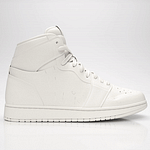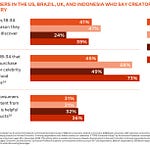🎙️Friday Features
Today’s guest is a writer and social media lead at the Morning Brew, a daily business newsletter with over 2.5 million subscribers. He’s grown his personal Twitter account to over 13,000 followers in less than sixth months by talking about Twitter strategy, building an online audience, and hating on LinkedIn.
Say hello to Toby Howell.
🎧 To learn more about the the writing process behind the Brew, the difference between running a brand Twitter account versus a personal account, and the cold email that landed Toby the job in the first place, click the play button on the audio player at the top of this email.
RG: Good Morning Crashing Up family and welcome to another episode of Friday features. If you're new here over the course of each week I interview some of the smartest, most innovative minds I can find. And we'll share our conversations with you here every Friday. I'm really excited for this week's guest. He's a writer and social media lead at the morning brew of business newsletter with over two and a half million subscribers. He's grown his personal Twitter account to over 13,000 followers in less than six months by talking about Twitter strategy, building an online audience and most importantly, hitting on LinkedIn. And I'm a huge brew fan. I know I've been a longtime reader, I think a lot of other listeners are as well. So with that, with that being said, I'd like to introduce it, Toby Howell. Toby, thanks for taking the time really excited to dig into this with you.
TH: Yeah, very excited to dig into the nuances of hating on LinkedIn.
RG: So to start, can you just walk me through a bit how you ended up at the brew, I know you are a writer, and you started as a writer, so just walk you through that?
TH: Yeah, so I have a bit of an interesting path to the brew. right out of college, I graduated 2019. I was working in Portland, Maine, pretty dead end, like I was working at a sports marketing firm, but was with two other guys was getting paid on the table, like really, really not exactly launching the career at a at a great spot. But then I discovered the brew, and I knew that my writing style kind of like mirrored their writing style, and basically just kind of sat there trying to find a way in to the brew. And the way in that I finally found was was sending a cold email to Alex and Austin, the two co founders, pitching them a new product idea. It was called sports brew. And yeah, basically said, like, you guys should be in the sports vertical, which is something that they had obviously already thought about. But then they said, Alright, we'll hear you out. And so then I wrote them a full sports brew, they said, we're not going to do a sports group of maybe you should interview for the for the writer role, wrote them a few more newsletters to look at. And then eventually, in the span of about a month went from not knowing anyone to bring into having a job at the brew. And then from there, once I once I actually started writing, about a month into my tenure, I also took over the social media, because our previous social media person left and again, no prior experience, but just asked for that literally asked for the passwords, and said like, Hey, I have some ideas. Do you mind if I like get those passwords and credit to them? They they just turned him over to me a month and a half into my into my role? And yeah, it's just kind of grown from there. And yeah, and my personal account has also grown just from basically me sharing all the stuff I try out on the broom account. And so yeah, it's been it's pretty crazy trajectory that started in Portland, Maine. And now we're here. Yeah, that's awesome. And you always hear like, the benefit of a startup is you get kinda to wear so many different hats, and you get to put your hands in a lot of different projects.
RG: I’ve seen that with Bombas a bit too but it's still a larger company. So with that the ability that you've had to just kind of like grow your following and build a name for yourself as a social media person is invaluable.
TH: Yeah, absolutely. No, it is a credit to like the brew as as just like a company that, like there's no reason that I should have been able to step into that role. But they're just like, hey, yeah, if you if you're confident about it, go for it. It's amazing.
RG: So I want to start at the writing piece, because that's initially what you came on to do. I've always been curious, can you walk me through a bit of the writing process that goes on behind the scenes, the newsletter, so I know you have multiple contributors? Somehow you all manage to have the same conversational funny tone? How do you decide who covers what's topics, make sure it all flows, etc.
TH: It's I was also surprised about because I asked the same question when I interviewed him, like, how do you guys do it? And it's, it's, it's a lot more free flowing than you might think. So from the first part of the day, all of us are just kind of in the new cycle, just looking around. So we have, we have three full time writers and then like a full time managing editor, and that's Neil. And we kind of rotate through on days. So I write Monday, Wednesday, Friday, and we get like, paired up with other writers. And so the the early part of the day until about even like noon to one, we're just reading the news and just kind of getting a sense of what the biggest stories of the day are. Um, and we have a Slack channel that we just throw ideas in called daily stories of just yeah, stories we think are interesting to cover. Some days. It's just like very, very clear what the top story is going to be and then some days, it's just, it's it's more of a grind and you have to kind of dig deeper. But so then right around right around noon I'd say usually stories have bubbled up. And then the writer say like, hey, I want to, I want to grab tik tok, and I want to grab whatever the the antitrust hearings, and then we'll go and run, we'll just everyone will go away, get into their little writing hole, crank out a piece and then we actually toss them in a Google Doc, like every single Bruce starts as a Google Doc, every morning. And then once every story is in, Neil, the editor will come look at them. Literally just comment on the Google Doc any tweaks he has. Um, and then after that, there's a fact checking around that we used to do all ourselves, we used to do like all the edits, in fact, checking ourselves. But now we have a freelancer comes in her name is Holly, she, she's a wonderful woman. She comes in reads, it all does a fact checks. And those are like the name statistics. Like any numbers, I'm just like, making sure that everything is factual. And then from there, we take it into like our newsletter system that kind of converts it into the newsletter that you're gonna see. And then we send emails to ourselves. So as like a final step, to like, read through it, make sure everything looks okay. And sometimes, and then we make any changes, send another test email, send another test email, and that and then we set the newsletter around like 630 in the evening, and then do it all again the next day. So are you on deadline, you said 630 is kind of your cutoff point. So I mean, our only deadline is we have to get it out by 6am the next day. And so like during the election cycle, um, Neil was waking up at 6am, making sure that nothing had like changed overnight. Like we didn't want to have to send an email out and like they had,like a president was was decided at midnight. And so like, technically, we can work all the way up until 6am. When we need to send it there is no hard and set deadline. Oh, we usually finish around 630 in the evening. Yeah. So on the days that you are writing, how have you found to balance the kind of Twitter role as well, because that's something that you really need to be quick on your feet with you got to be thinking like, right when people post or write when news breaks, you got to be on top of it. Yeah, I mean, that's why I said we embed ourselves in the new cycle. And like, the new cycle happens on Twitter, too. So like, I'm pretty much on Twitter all day, like we all are. And yeah, and then it's just a matter of reacting. Yeah, like you said, in real time to developing stories. Um, but yeah, it helps to that our whole company is very, like very much Twitter savvy and on Twitter, so like, people are always throwing ideas into our social media, Slack channel. And just riffing and deciding like, Oh, my God, Nicola earnings are out, like, what should we do? So yeah, it's just, it's just the jobs kind of like, mesh nicely together, because researching news for the actual writing helps the social media side of things as well. So yeah, they're pretty correlated.
RG: Totally. On the Twitter front you came in no social media experience, just ask them to fork over the passwords. You kind of have this blank canvas now where they gave you the creative control. What did you do when you started? What was your mindset? What were you trying out? And how is that evolved?
TH: Yeah, so my mindset was, I had said in my interview process that I think that the blue Twitter could be like better because before it was, it was a lot of it was just kind of regurgitating stuff that was in the newsletter and just like taking a fun fact and putting it on the Twitter account. But like in doing so, what it doesn't really give any people any incentive to follow you because they just saw it in the newsletter. So I kind of had this much snarky or much more like finance twittery voice for the morning brew account that I had brought up multiple times in my interview and so then when it like it was like Showtime I just tried to convey the voice or like the image of the Twitter account that I had in my mind and yeah, people just initially people like really went nuts when the when they was like clear the morning room voices change because there's something about seeing like, a verified like news outlet just like talking like a normal person and, and like shooting the shit with people that like really got people taken aback at first. So yeah, we enjoyed like this really huge, like initial follower follower jump. Um, and yeah, since then, it's just been honestly trying to step into more of like a real social media role.
In the end, everything was fine. I was just experimenting. But now like I'm trying to figure out, alright, what are we trying to do on social media? Like what are we trying to do across multiple platforms like? So it's it's been an evolution for me personally, of going just from experimenting phase to like actually trying to take it to the next level
RG: Have you found because I think your personal account kind of carries the same voice? Do you find that you need to maybe turn like sensor down your personal voice on the brand account or confusing the two? Or do you think it just flows seamlessly over?
TH: It does kind of flow seamlessly, which, which is great because like I write the newsletter also write tweets. And like, I'm just very much I'm just like, very in tune with, like the brew voice across all platforms. And so like, it's very lucky for me that Yeah, the brew voice is kind of my voice. And I mean, Neil also tweets a lot from the from the brew account. And, yeah, so I think that the only toning down I would do is, yeah, I mean, just try to stay like the brew count, try to stay out of like politics as much as we can.
Yeah, there's not, there's not like a whole lot of toning down, which is, which is really nice. Because like, I don't feel scared to post on the account, either. Because it's like, it feels like posting on my account at this point. Um, so yeah, that's a good question. But there's not a whole lot of toning down, I would say, yeah. Now, that's great. And the fact that you've been, you have a couple people running the account, and at least from an outside perspective, and I see I'd say a good chunk of your tweets, I would have no idea that it's not the same person. Right. So it's pretty, pretty cool. If you want a little insider tip, Neil, just got a Google phone like the pixel. So if you ever see it from Twitter from Android, that was something Nielsen, and then I'm like, Twitter, from web, Twitter from iPhones.
RG: Noted, insider tip. You heard it here first. So growth strategy… can you walk us through some of the things you've seen that worked on the brand side and the personal side and some things that you might have thought were great for brand you tried on your personal on that ended up as duds?
TH: Yeah, that's interesting. So I think I'll start with personal. The number one growth tactic for personal account is like Twitter threads, like that is where I've gotten, I'd say like, 99% of my growth. Um, yeah, my first like, initial follower bump on my personal was, I posted like a thread of things I had learned running the morning brew account, and that like netted me 4000 followers and like, one day, and I was like, whoa, whoa, because I yeah, I went from like, literally, like 400 followers to 4000. And I was like, okay, so like, Twitter threads, like, holy crap. So I I've definitely, and then from there on, yeah, like, I've done a thread on cold emails and a thread on Twitter threads. And every time you post a thread, like you're gonna net, so an exit amount of followers. So yeah, Twitter threads are just like, the number one growth mechanism for my personal account. But then on. So I thought, all right, let's do some threads on the brute count. Like let's see how it goes. But it just is not the same.
Because like, as personable and as like relatable the brew account is it's still not a person. And like people just trust people more on on social media to give them like actionable advice, then, like faceless brand account, which, which is tough. And I do think that there is there is an opportunity for the brew to post threads and have them drive the same amount of follower growth. But yeah, that was something was very surprising to me that like you would think that like a fun business newsletter writing a thread about like, how to interpret like, the market data, like that would be really well but again, since it's like faceless, it just doesn't it doesn't quite pop off as much as your personal account.
RG: Would you think that that's because you've given like, if you started before you jumped on and it was like kind of regurgitating stuff from the newsletter and you did a thread in that format. Do you think that would be effective or because you kind of gave it this fun playful voice that now people are used to that and you're going to going back on what it was?
TH: No, well, I mean, the threads are trying to capture the same voice so it's not like the threads are dry enough. It's just that unfortunately like the brew is faceless like, um, and I was talking with I don't know if you follow like good marketing examples like Harry, Harry's marketing examples, she like debated between. The name was good marketing examples and he debated like, for a long time on whether to change to Harry's marketing examples, because yeah, he was facing the same thing. It's like people trust people. I'm like, I've built this great brand, but I want to tie it back to. And like, I honestly was advocating against it, because I'm like, no people love the authority of like, good marketing examples. You built up all this authority, but eventually he did change it. And I think it's worked out for him. Because Yeah, just like, people connect with people more than than brands. Yeah, that makes a lot of sense.
RG: So on the growth side from the brand account, what have you seen that's worked there that hasn't translated over the personal side?
TH: Yeah, for the brand. I mean, we've had a couple of tweets go pretty viral. And like they've they've honestly kind of run the gamut like some of them are just like clips on on like videos funny videos ago around some of them are like, like legit memes that have grown. And I think that from from like the brand account you can have, like it's it's, I've tried to post like some some memes I don't think that we're going to make it are going to like do on the brand account all I try to post them on my own personal account. And like, it's just not that funny when it's coming from a person. It's kind of like the it's the same thing in reverse where like no one wants to see like, Toby's means because like I'm not known for that and like it's just kind of like falls flat. But means coming from again that like faceless, verified like news outlet brand account, like it just that makes it that much more more funny. It's like when any brand account like from Netflix or Wendy's or Xbox tweets in like a self aware way or like tweets out something funny like that just really strikes people because you're like, Oh my gosh, like this brand is like oh my god, they're so hip and self aware. So I think that impact hits much better on the brand account versus my personal account.
RG: Yeah, I agree. I mean, like you said, with the Wendy's stuff and Xbox anytime I see a brand kind of personify themselves and kind of talking about first or even third person but make it seem like they have emotions and feelings it definitely Right. Exactly. Yeah, you hit it spot on. So I know you often like will comment on Elon Musk like right when he posts I'm assuming you guys have notifications on or you're just on top of it. I saw you stirred the pot with tornado and barstool. What came from that? Did you have any kind of nerves going into it? Because obviously you've seen them meme the hell out of everyone and like they have a pretty ravenous fanbase.
TH: Yeah, that was a crazy. That was a crazy day because I had actually, I mean, obviously in quarantine, like Dave had gotten way until like the finance side Twitter. So like, it had been a goal for a long time to like, yeah, like poke the bear basically, like get under his skin because like, yeah, cuz like, I knew that. It's ravenous, like everything, it would just spiral into this, this really big thing. So I would just every once while just keep poking them with with like, a shot, like a job here and there. And then yeah, finally, I was literally just like, in my, in my basement, like, got retweeted and like it was on and like the whole like, I had both Alex and Austin like, like, texted me like, careful, like, what, like, what are you doing? And I'm like, No, this is good guys. Like, this is what we were looking for. And And so yeah, it was definitely dicey. But, like one, I'm familiar with Barstool and like I know how they operate. So I kind of knew how to leverage it. And then but I also wanted to, like, represent the brew well, like, again, I care a lot about like the brew ban. So like, I'm not going to do anything that is gonna, like jeopardize our whole vision. But yeah, it also totally worked for what I was trying to do. Like, we gained like 3000 followers in a day. Like it was it was exactly everything that I thought would happen did end up happening from a growth perspective. So yeah, that was like definitely intentional. I've been trying to do that for a long time. It was nerve racking. But yeah, just just operated within what like, how I thought we should and we got like, three or four tweets out of them, which is which is like huge, so yeah, I don't think you got actually coming after you either. So I think that's a win. There's a funny story too. I posted a thread on my personal account about like, David started a podcast with like a tech talker I saw like scented pop and I basically said like, Dave's like sucks. And he in the next podcast, I see him I call this out again. He's like, these freak these like, folks from morning brew, like who they think they are and like, Dan like so. So eventually something great is gonna come out of this. I don't know what it's gonna be. But yeah, kind of kind of a surreal moment.
RG: Yeah, and it's pretty funny because he's such a figure that takes so much backlash that the amount of like shit he gets for yours to kind of stick through and trigger it enough where he like remembers him and references it again like, yeah,
TH: yeah, no, it's true. It's a it's a weird world.
RG: Totally. So on the social media front in general, I know email wise your big KPIs really unique opens. Right. So what are your bigger KPIs for social?
TH: That's something that we've had a lot of conversations about, actually. Because we're not a traditional news outlet whereI've talked to people like you talked people at BuzzFeed, their KPI is let's drive traffic, like we got to get so and so millions of hits to traffic. So like, that's all social media is is trying to get traffic to their website. But for us, like, I'm very much unburdened by any of those, like traditional, like, I don't need to drive traffic to our website. I don't even really need to drive signups because I, like it's social media has proven that like, not a lot of people sign up from Twitter or from from Instagram, unless it comes from what someone that you know, sharing their referral link.
But like I'm very much unburdened by any traditional KPI so it's, it really is like, a voice to play, like letting people connect with voice on Twitter. So then hopefully, they go and subscribe. Um, yeah, and then like an audience building perspective, like community building, that's probably like, the next step for me is like, the morning brew has the potential to create, recreate, like, inside jokes, every, like people feel like they understand, like we referenced fairly oddparents this morning, and people are like, Oh, I know, fairly oddparents. And so like those moments where you really connect with the brew, I want to try to bring them on to social more until, like, it feels very much like the brew is like this community that it's almost, I have you have you seen far guys like that Twitter account. Like, they're so good at creating like these inside jokes that their audience can connect with. And it's just like this very, very active and engaged community. And I think we still have like room to improve on that front. That's probably like the next step for the bootcamp.
RG: Definitely. Then for your own personal account, I know the whole idea, you build the audience. And once you have the audience to eventually try to monetize a lot of people go through the course route, the kind of build once, twice, I saw you tweeted about potentially launching this course. Can you give a little insight on where you're headed with that?
TH: Yeah, so actually, so I've been really nervous about Yeah, like, go in the courtroom. Because one, like, I think so many, it just comes across, it's just like, really, I don't know how to say it, but just like inauthentic and like, like the, like the money Twitter side of Twitter, like, I really don't vibe with with like, how they like four left, three left to left, like, yeah, so like, I don't want to ever get into that territory. Um, but so going back to the audio course, I was approached by there's like the startup called knowable, and they help, they like work with creators to create on audio courses, and they're like, an hour long, they'll help you with, like, the production, the, like marketing side of it, and the distribution. And so for me, like, this is a really good way to just like dip my toe in the water without like, diving in fully. I'll have like, support, I'll have like guidance on how to do it. And I hopefully it's not going to come across as like, like course chilling or anything like that. Um, because yeah, like, it's something that I do want to pursue, but I just want to do it in like, a, an authentic way. So yeah, this is this is like my first step, the course is going to be about writing Twitter threads and how to use Twitter threads to grow your following. So it's something that I feel like it's very much in my wheelhouse to so I feel like comfortable and confident like doing a course about it. So that helps with like the imposter syndrome II side of it. Um, and so yeah, like, I'm super excited for it. I've never done any sort of like audio product or like any podcast, so it should be interesting to see how that goes. But I'm excited and hopefully this like, opens opens my eyes to like, being able to sell, sell, sell something online.
RG: Yeah, yeah, definitely. I think we've known about the power of audiences now for years, but I think for whatever reason, in the last year or two weeks really started to see how like, anyone can build this audience and how powerful it actually is. And just like optionality and being able to launch a course to get new news to do whatever else you want to do so I think that's a great next step.
TH: Yeah.
RG: All right. Well, I appreciate you taking the time. This was awesome. I learned a ton. I'm sure everyone else did as well. If you want to plug anything you got going on whether it's the brew account, your personal account the course Go for it. Yeah, I mean, yeah, always follow the brew at morning brew on Twitter and Instagram. Subscribe, if you haven't yet. And then yeah, be on the lookout for this noble course coming and I think it's gonna be in about two weeks. It's whenever I get it done, basically, but be on the lookout for the noble course. All right, sounds good. Well, that's it for this week. Thank you again, Toby. If you liked this episode, please let me know you can shoot me a DM on Twitter. You can click the feed letter link in the newsletter, you can shoot me an email. All of this feedback is greatly appreciated and will be used to make future editions the best that it could be. Thank you again and have a great weekend.
If you enjoyed this interview and want to hear more like this, subscribe to the newsletter below.
Know someone who could benefit from this? Send it their way!











